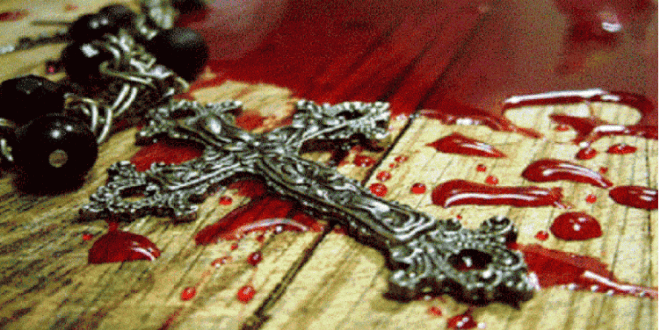“Real Time” host Bill Maher made a stark observation on his Friday show that cut through the noise of selective media coverage and exposed the glaring double standards in global activism. The systematic killing of Christians in Nigeria by Islamist groups like Boko Haram is being ignored by both media and student protesters because “the Jews aren’t involved,” Maher declared. His comparison was devastating in its clarity: “They are systematically killing the Christians in Nigeria. They’ve killed over 100,000 since 2009. They’ve burned 18,000 churches. This is so much more of a genocide attempt than what is going on in Gaza.”
Yet where are the campus protests? Where are the viral social media campaigns? Where is the round-the-clock media coverage? Maher’s blunt assessment—”It’s the Christians and the Muslims — who cares?”—exposed a disturbing truth: if Israel isn’t involved, if there are no Jews to blame, the suffering simply doesn’t register in contemporary progressive consciousness or media narratives.
Maher’s claim that this represents “so much more of a genocide attempt than what is going on in Gaza” is backed by overwhelming evidence. The numbers are staggering and demand urgent international attention.
Nigeria: A Christian Holocaust in Progress
According to multiple sources cited in recent reports:
- Over 185,000 people have been killed in Nigeria since 2009, including 125,000 Christians and 60,000 moderate Muslims
- 19,100 Christian churches have been destroyed, looted, or violently closed since 2009
- 32 Christians are killed daily on average in Nigeria
- 7,000 Christians were massacred in just the first 220 days of 2025
- 15 million Christians have been displaced from their homes
- 250 Catholic priests have been kidnapped since 2015, with at least 11 murdered
The perpetrators include Boko Haram, ISWAP (Islamic State West Africa Province), and Fulani herdsmen operating across multiple Nigerian states including Taraba, Adamawa, Borno, Kaduna, Benue, Plateau, Enugu, Imo, Niger, Kogi, Nasarawa, Bauchi, Yobe, and Southern Kaduna.
The crisis extends far beyond Nigeria’s borders. Open Doors reports that 150,000 people have been killed in Jihadist violence across sub-Saharan Africa over the last decade, with over 16 million Christians driven from their homes across the region.
In Mozambique, Islamic State Mozambique Province (ISMP) has systematically targeted Christian communities, issuing multiple statements in September 2025 alone claiming responsibility for beheading Christians, burning churches, and destroying Christian villages.
Nigerian Bishop Mathew Hassan Kukah describes kidnapping as “a criminal industrial complex” generating millions in revenue. According to SBM Intelligence, between July 2023 and June 2024, hostage-takers demanded $32 million in ransom for 7,568 abducted people. However, experts believe the targeting of Christians goes beyond mere economics.
Emeka Umeagbalasi of the Catholic-inspired NGO Intersociety warns that this represents “a genocidal campaign by Jihadists intent on wiping out Christianity from Nigeria.” His chilling prediction: “If the trend continues, Christianity could be wiped out from Nigeria by 2075.”
A Stark Regional Contrast
While Christians face systematic persecution and demographic collapse across much of the Middle East and Africa, one country stands out as a remarkable exception: Israel. Despite ongoing conflicts, Israel remains the only nation in the Middle East where the Christian population is growing. Israeli Christians enjoy full civil rights, religious freedom, and legal protection—a stark contrast to their co-religionists elsewhere in the region.
Christian Experience in Palestinian Authority Areas
The contrast becomes even more striking when examining Christian life under Palestinian Authority control in Judea and Samaria, and historically in Gaza. While international attention focuses intensely on Palestinian grievances, the systematic decline of Christian communities under Palestinian governance receives little scrutiny.
In Bethlehem, once a Christian-majority city, the Christian population has plummeted from 85% in 1950 to approximately 12% today. Similar demographic collapses have occurred throughout areas under Palestinian Authority control, driven by a combination of economic pressures, social marginalization, and religious intimidation that receives minimal international attention.
In Gaza, the tiny Christian community has faced increasing pressure from Hamas and other Islamic groups. The 2007 murder of Rami Ayyad, manager of Gaza’s only Christian bookstore, and subsequent attacks on Christian institutions highlighted the precarious position of Gaza’s Christians under Hamas rule.
The Silence of Selective Outrage
Maher’s observation exposes a fundamental inconsistency that reveals the hollow nature of much contemporary activism. While every casualty in Gaza generates international headlines, emergency UN sessions, and passionate campus protests complete with tent encampments and calls for divestment, the systematic extermination of African Christians—occurring on a scale that objectively dwarfs the Gaza conflict—barely registers in mainstream discourse.
“Where are the kids protesting this?” Maher demanded, his question cutting to the heart of the matter. University students who can mobilize thousands to march against Israel remain conspicuously silent as 32 Christians are murdered daily in Nigeria alone. There are no viral TikTok campaigns, no celebrity endorsements, no academic boycotts targeting the perpetrators of this genuinely genocidal violence.
The answer reveals uncomfortable truths about which victims matter in contemporary progressive narratives: if Israel isn’t the perpetrator, if Jews can’t be blamed, the suffering becomes invisible. The selective outrage isn’t about human rights—it’s about maintaining a predetermined political narrative where only certain victims deserve advocacy.
The crisis facing African Christians represents one of the world’s most urgent humanitarian emergencies. With an average of 32 Christians killed daily in Nigeria alone, and entire Christian communities facing potential extinction, the international community’s silence is not just tragic—it’s complicit.
As Maher concluded, “If you don’t know what’s going on in Nigeria, your media sources suck. You are in a bubble.”
The time has come to burst that bubble. African Christians deserve the same international attention, advocacy, and protection afforded to other persecuted communities. Their lives matter just as much, even if—as Maher noted—”the Jews aren’t involved.”
The question isn’t whether this constitutes genocide—the evidence is overwhelming. The question is whether the world will continue to look away while an entire Christian civilization faces extinction across vast swaths of Africa.




